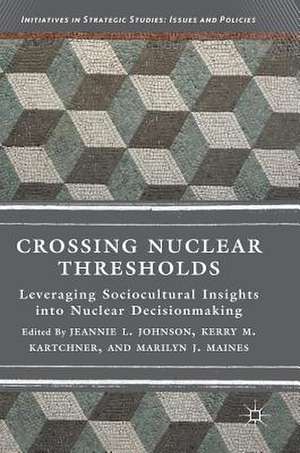Crossing Nuclear Thresholds: Leveraging Sociocultural Insights into Nuclear Decisionmaking: Initiatives in Strategic Studies: Issues and Policies
Editat de Jeannie L. Johnson, Kerry M. Kartchner, Marilyn J. Mainesen Limba Engleză Hardback – 7 mai 2018
| Toate formatele și edițiile | Preț | Express |
|---|---|---|
| Paperback (1) | 888.01 lei 6-8 săpt. | |
| Springer International Publishing – 28 dec 2018 | 888.01 lei 6-8 săpt. | |
| Hardback (1) | 893.21 lei 6-8 săpt. | |
| Springer International Publishing – 7 mai 2018 | 893.21 lei 6-8 săpt. |
Preț: 893.21 lei
Preț vechi: 1089.29 lei
-18% Nou
Puncte Express: 1340
Preț estimativ în valută:
170.92€ • 182.77$ • 142.51£
170.92€ • 182.77$ • 142.51£
Carte tipărită la comandă
Livrare economică 17 aprilie-01 mai
Preluare comenzi: 021 569.72.76
Specificații
ISBN-13: 9783319726694
ISBN-10: 3319726692
Pagini: 288
Ilustrații: XXI, 277 p. 6 illus.
Dimensiuni: 148 x 210 mm
Greutate: 0.51 kg
Ediția:1st ed. 2018
Editura: Springer International Publishing
Colecția Palgrave Macmillan
Seria Initiatives in Strategic Studies: Issues and Policies
Locul publicării:Cham, Switzerland
ISBN-10: 3319726692
Pagini: 288
Ilustrații: XXI, 277 p. 6 illus.
Dimensiuni: 148 x 210 mm
Greutate: 0.51 kg
Ediția:1st ed. 2018
Editura: Springer International Publishing
Colecția Palgrave Macmillan
Seria Initiatives in Strategic Studies: Issues and Policies
Locul publicării:Cham, Switzerland
Cuprins
1. Introduction: Sociocultural Approaches to Understanding Nuclear Thresholds.- 2. The Cultural Topography Analytic Framework.- 3. Iran’s Strategic Culture: Implications for Nuclear Policy.- 4. Prospects for Proliferation in Saudi Arabia.- 5. Israeli Strategic Culture and the Iran “Preemption Scare” of 2009-2013.- 6. Cultural Underpinnings of Current Russian Nuclear and Security Strategy.- 7. Ukraine’s Nuclear Culture: Past, Present, and Future.- 8. North Korea's Strategic Culture and its Evolving Nuclear Strategy.- 9. Conclusion: Using Strategic Culture to Explain Real-World Decisionmaking.
Notă biografică
Jeannie L. Johnson is Assistant Professor in the Political Science Department at Utah State University, USA.
Kerry M. Kartchner is Visiting Lecturer at the Bush School of Government and Public Policy at Texas A&M University, USA.
Marilyn Maines is Faculty Member at the Center for Advanced Study of Language at the University of Maryland in College Park, USA.
Kerry M. Kartchner is Visiting Lecturer at the Bush School of Government and Public Policy at Texas A&M University, USA.
Marilyn Maines is Faculty Member at the Center for Advanced Study of Language at the University of Maryland in College Park, USA.
Textul de pe ultima copertă
This book applies the cutting-edge socio-cultural model Cultural Topography Analytic Framework (CTAF) pioneered in the authors’ earlier volume Strategic Culture and Weapons of Mass Destruction: Culturally Based Insights into Comparative National Security Policymaking (Palgrave Macmillan, 2009) with an eye towards isolating those vectors of nuclear decision-making on which the US might exert influence within a foreign state. The case studies included in this volume tackle a number of the nuclear challenges—termed “nuclear thresholds”—likely to be faced by the US and identify the most promising points of leverage available to American policymakers in ameliorating a wide range of over-the-horizon nuclear challenges. Because near and medium-term nuclear thresholds are likely to involve both allies and adversaries simultaneously, meaning that US response will require strategies tailored to both the perception of threat experienced by the actors in question, the value the actors place on their relationship with the US, and the domestic context driving decision-making. This volume offers a nuanced look at each actor’s identity, national norms, values, and perceptual lens in order to offer culturally-focused insights into behavior and intentions.
Caracteristici
Provides focused case studies on key strategic states like Iran, Ukraine, and North Korea Wide geographic scope of the contributed chapters offers insight into US strategic relations with the Middle East, Europe, and Asia Contributors vary from academics to practitioners and government officials













